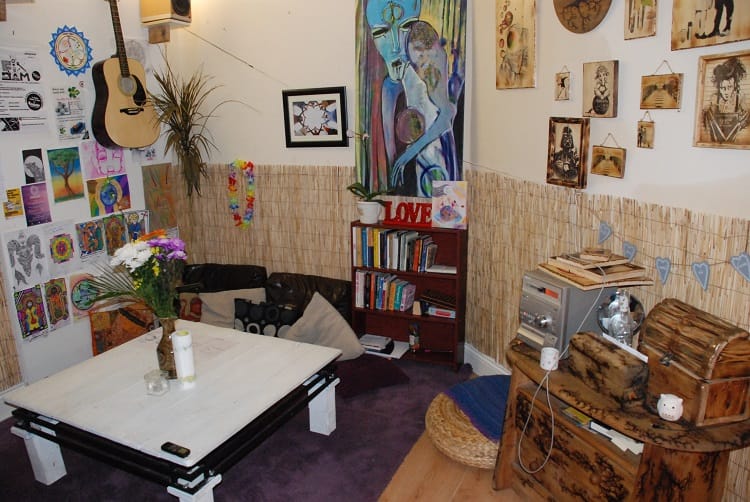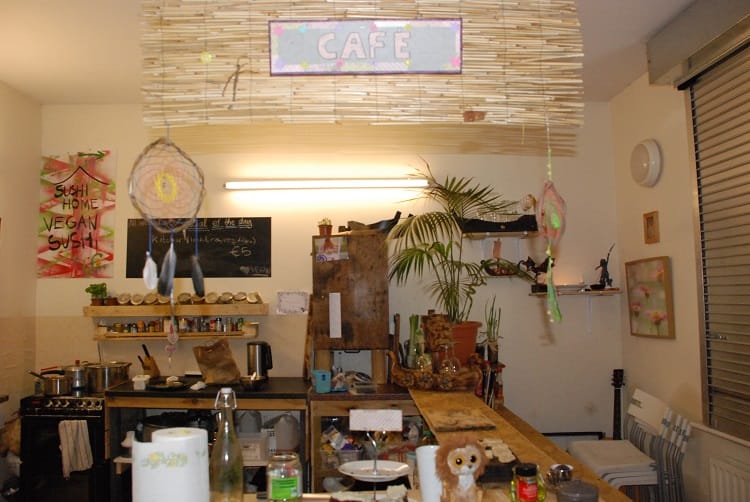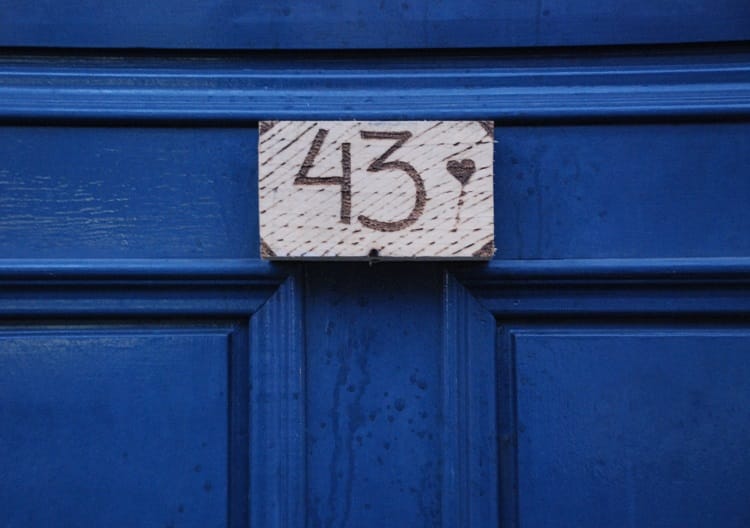What’s the best way to tell area residents about plans for a new asylum shelter nearby?
The government should tell communities directly about plans for new asylum shelters, some activists and politicians say.
Ellen Aveiro used to be a prison administrator in Paranagua, in southern Brazil. These days, she runs a community centre on Dorset Street.

The rectangular wooden block on the blue front door reads “43”. A heart-shaped balloon, hand-drawn in black ink, sits next to these digits.
Inside Ellen Aveiro gets down to work.
What was a Polish produce shop on Upper Dorset Street until recently now plays host to Aveiro and anyone who’s looking to sing, dance, cook, and love.

On a recent Wednesday, inside a small room on the building’s ground floor, Aveiro sat cross-legged and shoeless on a purple rug and sipped her green tea.
Her cultural centre is a work in progress. She moved in three months ago with a clear vision.
“The idea of this place is to work with the things that you love,” she says. “Most people do art but they have to work to survive. Basically, it’s to develop projects over time.”
The 25-year-old Brazilian took over the lease of three rooms in the building in late August. The rest of the space upstairs is student accommodation.
To the left of the hallway is Aveiro’s programming office. Opposite this is a bright lounging area, with guitars, books, artwork, floor seats, and a makeshift café and kitchen.
From the street, it looks like a public work space, but at the moment it’s reserved for those attending a class or workshop inside.
Below, at basement level, is the main studio and performance area.
Aveiro, dreadlocked and wrapped up from the cold, says she struggled for two years to find a permanent home for All You Need Is Love, as the centre is called.
“In Dublin 3, we had a warehouse for a while, but then the landlord said we’d to leave,” she says. “It was a whole process. But now we’re here.”
Aveiro, who is from Paranagua, a small city in southern Brazil, teaches Brazilian dance classes, singing lessons and qigong, a Chinese system of movement and breathing techniques.
Other activities at All You Need Is Love throughout the week include hip-hop dance classes, acting, music, yoga, and cookery.
Sat on a wooden chair next to the café is Denise Penteado, a friend of Aveiro’s who helps out around the centre, mainly in the kitchen.

“We try to cook things that are accessible to everyone,” she says, polishing off her kitchari, a dish of lentils, rice, vegetables, and tofu. “There are some places here [in Dublin] where you can get vegan food, but it’s quite expensive. It’s vegetables, use your creativity.”
Each evening, people arrive at the centre for their chosen class or to work on a project, while upstairs Aveiro and Penteado cook dishes for €5.
Recently, others have taken to the kitchen too. It’s all part of the ethos: create what you want, see what comes out. Tomorrow it’s an Italian cook. The next day, an Irish one.
“We have people from everywhere,” says Aveiro. “The idea at the moment is to have a collective kitchen, that every day is different.”
Aveiro arrived in Dublin when she was 21.
She was stifled by her law and administration course back home, tired of her job and inspired by her father’s travels while in the marines, before he became a detective on the streets of Paranagua. Europe beckoned.
Unlike many students who find themselves tucked away in lecture theatres and tutorials, Aveiro’s course had involved lengthy shifts at the local prison.
The young Aveiro, just 17 years old, was hired as an administrator at the local prison. It was built to hold around 200 people, she says, but there were often close to 1,000.
The worst part was working with statistics, a practice she felt reduced prisoners to figures and no more. “It was all the sadness of the world in numbers,” she says.
“The idea of a course in law was to do something to help people, but then I saw that everything was fucked in there,” she says. “I just realised I couldn’t do anything there even if I tried. Even the new people who’d come in and try and change something they would be treated like, ‘If you’re not part of the system …’ There was no point in being there.”
After one year working in the prison system while finishing her course the process became routine, almost bearable.
Then one day a small boy was taken by his mother to see his imprisoned father. She’d brought a gift. The mother, child in tow, extracted a small bag of weed from her bra. She was caught, arrested and imprisoned immediately.
“Imagine this kid who’s two years old going with his mum to see his father,” says Aveiro. “Then the kid was there with no one, waiting on his grandma. What’s the opportunity for him? How’s he going to perceive life?”
And so she left.
Working initially with musicians and artists around Dublin, Aveiro then became involved with those in direct provision, the system of centres for asylum seekers that she describes as “just unbelievable” in its limitations.
Every Wednesday for four months, Aveiro would visit those at the centre on Hatch Street and provide activities and entertainment. With her own cultural centre now up and running, she’s trying to remain positive for fellow immigrants.
“I’m trying my best,” she says. “If I keep looking at things that are going wrong I won’t do anything. I’ll just sit and cry.”
Staring out the large window, streaked with condensation, onto Dorset Street, Aveiro and Penteado find constant amusement in the characters of the local community, who they plan on reaching out to eventually.
“Once we came to live here, we saw that necessity,” says Aveiro. “It’s something we want to develop, working with the community.”
It may take time, though. For now, Aveiro’s focus is on paying the rent with money made from each course and plate of food she sells.
In time, Aveiro hopes the classes the centre offers will expand in size.

The whole enterprise, centred on community, aims to break the conventional model of set course lengths, and the teacher-student dynamic.
“We’re getting there,” says Penteado. “We were having singing classes with Ellen in the morning. I’ve been to other singing classes before and they’re more technical. She’s trying to teach people how to listen to the body, song as therapy.”
Growing up in the countryside outside São Paulo, Penteado learned to cook from her father. Aveiro roped her in to help in the kitchen after the pair shared a flat across the street from No. 43. For three months, she’s watched her Aveiro work her magic.
“She really encourages people,” says Penteado. “Sometimes you have potential but you’re blocked from all the systems and you don’t trust yourself. This project inspired me to keep going.”
Each class costs €10 and the current schedule runs Monday through Friday. Anyone can come along and sign up. On Sundays, there is a jam session downstairs, a weekly event Aveiro describes as “crazy busy”.
In time she aims to roll out a membership scheme for regular attendees.
Aveiro was frustrated with the difficulty she encountered when putting on gigs, arranging pop-up events, and hosting 12-hour mini festivals. All You Need Is Love is a pace changer for her as much as for those who visit.
Having realised that flying solo isn’t an option at this new cultural hub on Dorset Street, Aveiro has applied for grants and funding left, right, and centre.
“At first I was really trying to do everything by myself, really independent with no money,” she says. “We’re still doing that but I don’t know how it’s going to be.”